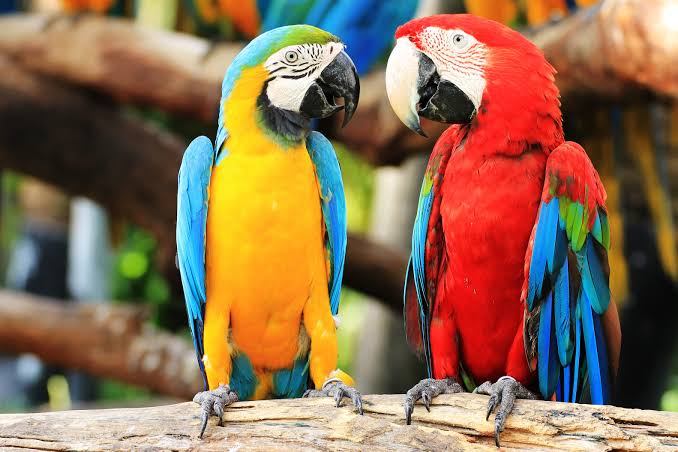
Parrot Parenting 101: Understanding Your Feathered Friend’s Behavior and Needs" – A guide to parrot habits, social needs, diet, and mental stimulation.
Parrots are intelligent, social, and emotionally expressive creatures that require dedicated care, mental stimulation, and proper nutrition to thrive. This guide will help you understand their habits, social needs, dietary requirements, and ways to keep them mentally and physically engaged. Learning to communicate with your parrot and providing a nurturing environment will ensure a strong bond and a happy, healthy pet.
🐶 Pet Star
13 min read · 30, Jan 2025

1. Understanding Parrot Behavior
Parrots are highly expressive and communicate their emotions through body language, vocalizations, and behaviors. Here are some common behaviors and what they mean:
- Beak Grinding: A sign of relaxation and comfort, often heard before sleep.
- Fluffing Feathers: Can indicate contentment or a sign of illness if persistent.
- Head Bobbing: A display of excitement or a way to seek attention.
- Regurgitation: A sign of affection towards their favorite human or mate.
- Biting or Nipping: A form of communication that can indicate fear, stress, or dominance.
- Tail Fanning and Eye Pinning: Signs of excitement, aggression, or deep focus.
Understanding these behaviors helps strengthen the bond between you and your parrot while ensuring their well-being.
2. Social Needs and Interaction
Parrots are incredibly social creatures and require interaction to prevent loneliness and boredom. Here are key socialization tips:
- Companionship: If you are away for long hours, consider getting a companion bird or dedicating daily quality time to your parrot.
- Talking and Training: Parrots love engaging with their humans through training sessions and talking exercises.
- Environmental Enrichment: Ensure they have a stimulating environment with toys, puzzles, and activities.
- Handling and Affection: Regular gentle handling and petting (if they enjoy it) strengthen your bond.
- Avoid Isolation: Keeping your parrot in an isolated room can lead to stress and behavioral problems.
A well-socialized parrot is happier, healthier, and less prone to destructive behaviors.
3. Diet and Nutrition
A well-balanced diet is crucial for a parrot’s longevity and health. Here is what a healthy diet includes:
- Fresh Fruits and Vegetables: Apples, carrots, bell peppers, leafy greens, and berries are excellent choices.
- High-Quality Pellets: Provide essential nutrients and should make up 60-70% of the diet.
- Seeds and Nuts: Should be given in moderation as treats, as they are high in fat.
- Cooked Grains and Legumes: Brown rice, quinoa, lentils, and chickpeas provide protein and fiber.
- Avoid Toxic Foods: Never feed chocolate, caffeine, avocado, onion, garlic, or salty foods.
A varied and nutritious diet promotes vibrant feathers, strong immunity, and overall well-being.
4. Mental Stimulation and Activities
Parrots are highly intelligent and require mental engagement to stay happy. Here are ways to keep them stimulated:
- Toys and Puzzles: Rotate different toys to prevent boredom.
- Training Sessions: Teach commands, tricks, and even words to stimulate their intellect.
- Foraging Games: Hide treats inside puzzle feeders to encourage natural foraging behaviors.
- Music and Videos: Some parrots enjoy listening to music or watching bird-friendly videos.
- Interactive Playtime: Engage them in activities like mimicking games, dancing, or playing with soft items.
A mentally stimulated parrot is less likely to develop behavioral issues like feather plucking or excessive screaming.
5. Common Health Issues and Care
Parrots require regular health checkups and proper hygiene to stay in good condition. Here are some common health concerns:
- Feather Plucking: Often caused by stress, boredom, or underlying medical issues.
- Respiratory Issues: Wheezing, nasal discharge, or difficulty breathing can indicate infections.
- Obesity: Resulting from a high-fat diet and lack of exercise.
- Vitamin Deficiencies: Poor diet can lead to vitamin A and calcium deficiencies.
- Parasitic Infections: Mites and fungal infections can affect skin and feather health.
Regular veterinary checkups, a balanced diet, and a clean environment can prevent many health issues.
Q&A Section
Ques1: How much time should I spend with my parrot daily?
Ans: At least 2-3 hours of interaction and supervised playtime per day are essential to prevent loneliness and stress.
Ques 2: Why does my parrot scream so much?
Ans: Screaming is a form of communication. It can indicate boredom, attention-seeking, excitement, or distress. Ensuring they have enough stimulation and social interaction helps reduce excessive noise.
Ques 3: How can I teach my parrot to talk?
Ans: Repetition and positive reinforcement work best. Start with simple words, use a cheerful tone, and reward them with treats when they mimic correctly.
Ques 4: What are the best beginner-friendly parrot species?
Ans: Budgies, cockatiels, and green-cheek conures are great choices for first-time parrot owners as they are affectionate and relatively easy to care for.
Ques5: How do I know if my parrot is happy?
Ans: A happy parrot is active, vocal, curious, and engaged in its environment. Fluffed-up feathers, relaxed body language, and playful behavior indicate contentment.
Ques 6: What should I do if my parrot bites me?
Ans: Stay calm, do not react aggressively, and try to understand the reason for biting. It may be due to fear, overstimulation, or lack of training. Positive reinforcement training helps in managing biting behavior.
Ques 7: How do I introduce a new parrot to my existing one?
Ans: Introduce them gradually by keeping them in separate cages within sight. Allow supervised interactions and observe their behavior before letting them interact freely.
Similar Articles
Find more relatable content in similar Articles

Sustainable Pet Products: What to Look for in 2025...
As sustainability becomes a ce.. Read More

Smart Homes for Pets: Automated Feeders, Doors, and Mo..
As smart home technology advan.. Read More

How Climate Change Affects Wild and Domestic Animals...
Climate change is dramatically.. Read More

How Pets Strengthen Family Bonds...
Pets are more than just compan.. Read More
Explore Other Categories
© 2024 Copyrights by rPets. All Rights Reserved.